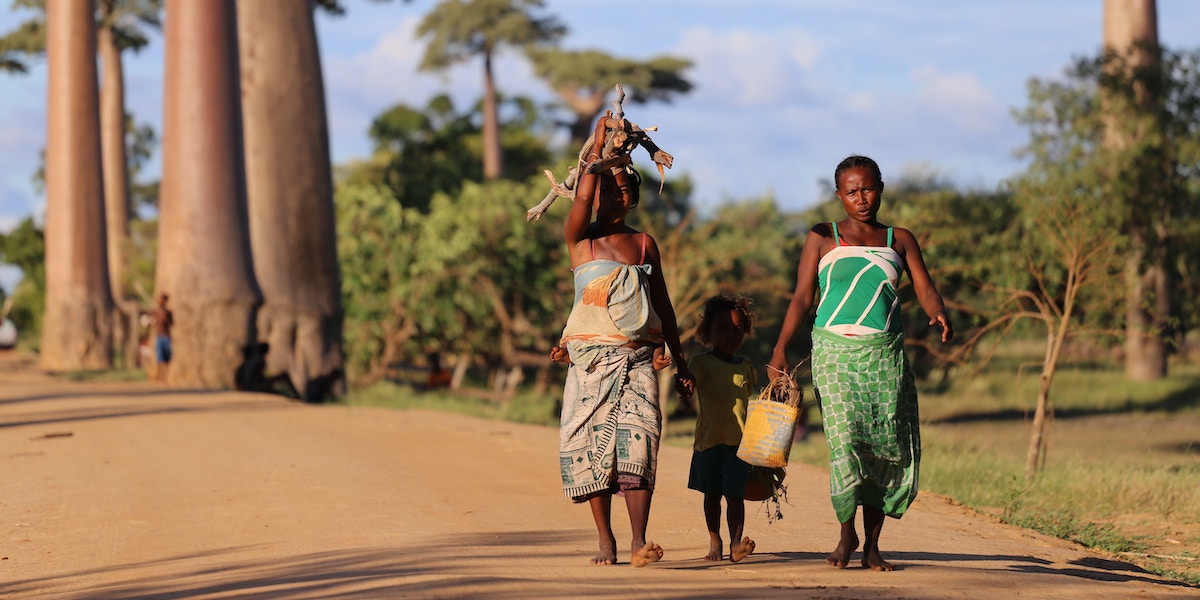READ ON TO DISCOVER:
- Why data can be sexist
- What single factor lays the foundation for women’s success
- How Melinda Gates maintains equality in her own marriage
As the co-chair of the Bill & Melinda Gates Foundation, Melinda Gates is a philanthropist, businesswoman, and global advocate for women and girls. World-renowned organizational psychologist and Next Big Idea Club curator Adam Grant recently hosted her at Wharton to discuss how we can all help women succeed, and more insights from Melinda’s new book, The Moment of Lift: How Empowering Women Changes the World.
This conversation has been edited and condensed. To watch the full version, click the video below.
Adam: One of my surprises when reading the book was how openly you write about your relationship with Bill. It had to be such an interesting moment when you’re building this incredible career at Microsoft and, all of a sudden, Bill Gates asks you out.
Melinda: Yeah, it was a Saturday—I was leaving my building at like 2:30 p.m. My building was right next to his, and we happened to be parked in the same parking lot, so he struck up a conversation. We talked for a while, and then he asked me out. But he asked me out for two weeks from Friday night. I’m 22 years old, and I’m like, “Two weeks from Friday night? That’s not spontaneous enough for me—call me up closer to the date.” Well, he called me up an hour or two later and said, “Is this spontaneous enough for you? How about tonight?”
I thought, “Well, he’s running this company… Obviously he’ll be interesting, right? I’ll go with him on one date.” I never expected it to go anywhere.
Adam: I loved reading that one of the first ways that you proved yourself to him was playing board games together.
Melinda: Yeah, I beat him twice at Clue. We both come from families that like to play games—Bill is hyper-competitive, but the kids always say to me, “You blame Dad for being competitive, but you’re pretty much just as competitive!” We can almost break out in a fist fight over a game of charades.
Adam: In some ways, it seems like your marriage to Bill was part of where the seeds were planted for your passion for equality.
Melinda: Yeah. Bill’s grandmother went to the University of Washington and played basketball at a time when very few women went to school. His mother also graduated college and was working at a time when not many women were working. So when we would go to his parents’ house for dinner, I could see them working together to further both their ambitions. So Bill came from a family that had equality—we both wanted it, but we didn’t always get it right at the beginning.
Adam: You reached a breaking point where you finally said to him, “I need you to do more.” How did you raise that?
Melinda: I had been at Microsoft for nine years, but when I got pregnant with our first daughter, Jen, I surprised Bill by telling him I was going to quit. He was shocked. He knew how much I loved my job, but I said, “You’re the CEO of Microsoft. If we want to have these family values that we believe in, somebody’s got to be home to raise our kids.”
“All lives, no matter where they are lived, have equal value.”
When it came time for Jen to go to kindergarten, the [better] school was not close to our house. I said, “Let’s just leave her in the neighborhood school until third grade, and then we’ll switch her.” Bill said, “No, I feel strongly about her starting now… What if I drove two mornings a week?” I was pretty shocked, because the commute was going to be an hour for him.
But he started doing it, and a few weeks in, one of the moms sidled up to me at school and said, “Have you noticed anything different in the last couple of weeks?” I said, “Yeah, so many dads are coming into the classroom and dropping off their kids.” She said, “Yeah. We went home and we said [to our husbands,] ‘If Bill Gates can drive his kid, so can you.’”
Trending: 5 Reasons Life Gets Better After Your 40s
Adam: When I read that, my first thought was, “Oh, the husbands now have cover to say, ‘I’m driving to school—I get to go meet Bill Gates!’”
Melinda: Yeah, well, he had to watch a little of that—but he was so engrossed with the kids. The thing he said that helped me reframe it was, “That’ll be such valuable time in the car with our daughter.” It turned out he was right. As your kids grow up, that’s when they talk to you—that drive in the car. Our youngest daughter is now 16, and Bill and I go with her to school one morning a week because it’s such good parent-teen time.
Adam: It seems like that was, in some ways, the launching point for building a more equal marriage. What did you do to make sure that you were both doing your fair share?
Melinda: Every night after dinner, we do the dishes together as a family. After a few weeks I got a little frustrated, though, because everybody had started to meander off after they thought they’d done their part, but I was still in the kitchen for another 15 minutes doing last-minute things. So one night, I go, “Wait a minute, nobody leaves the kitchen until Mom leaves the kitchen.” It turned out we could all do it in five minutes—so sometimes you just have to name what you need.
Adam: So you are building a partnership, and then you decide to start a foundation together. How did you dream up the Bill & Melinda Gates Foundation?
Melinda: We were on our first trip that we’d ever taken to Africa, really just as a vacation. But we got so touched by the people we met, and we kept saying to ourselves, “How is it that you don’t have many paved roads, or that these buildings have fallen in, or that so many women are walking around with no shoes, a baby on their back and in their belly, and something on their heads?” We just kept saying, “Why have these countries not moved along in terms of economic progress?”
It was on that trip, at the very end, that we were walking and talking on this little island off the coast of Zanzibar. And we just [decided] that the vast resources from Microsoft would go back to society. We had already been moving in that direction, but we were just like, “What could we do that might affect change in moms’ lives, in kids’ lives, and in families’ lives?”

Adam: Well, it’s been extraordinary to watch—I think it will one day be known as the most meaningful gift in all of human history. I have so much admiration for the discipline that you’ve brought to saying, “We’re not just giving money away to feel good—we’re actually going to try to make a dent in eradicating disease, and providing education, and lifting women up.” You could fund anything, so how do you decide what really matters?
Melinda: One of the pieces of advice we got early from Warren Buffett was, “Pick your target.” Because we were getting letters from all over the world from all kinds of things that are heartbreaking—childhood cancer, somebody needs a transplant, et cetera. But Warren said, “Once you pick your area of focus, you’re going to feel better, because you’ll know that you’re all in for what you’re doing. So when you have to say ‘no’ to other things, it will feel easier.” And it does.
We started to look at the continent of Africa and certain places in Southeast Asia and say, “Okay, why are there children still dying?” I read this New York Times article one Sunday morning, and I’m like, “Bill, kids are dying of diarrhea. How can kids die of diarrhea?” In the US, you take care of that—you go to your doctor, you go to your pharmacy, you get over-the-counter medication. So we started to say, “Well, what other things are killing children? Could we actually solve some of these health issues?”
Because as a couple, we have this belief that all lives, no matter where they are lived, have equal value. And you have to start with health, because if people don’t start with good health, you can’t go on to get a great education, and then get a job or create a business. So the majority of our funding these days outside the United States is for global health. Then we do some pieces to help people once they have good health, to lift themselves up with economic means.
As we’ve gone deeper into this work, we’ve seen that you have to take a gender lens across all of it because, if you don’t, you make false assumptions about medications or new farming techniques getting out to everyone equally. They actually don’t, because the systems focus more on men.
Adam: With all the work that you’re doing now to empower women, I think one of your first discoveries was about the importance of contraceptives. That was, I think, a big surprise to you. Why did that catch you off guard, and what do you think we need to do there?
Melinda: One of the best pieces of advice I got was from Warren Buffet’s wife, who has since passed away. She was doing a lot of work in Southeast Asia behind the scenes, and she said to me, “Melinda, go to countries and fly under the radar—just go in a pair of khaki pants and a T-shirt. If you can be on the ground talking to women and families, you will learn so much more about what’s really going on.”
“We look at all these systemic barriers for women in the developing world, but sometimes we can’t see our own.”
So I’ve now done that for 20 years in all these different communities in Africa and Southeast Asia. I talk to women about vaccines, and they tell you, “I walk 10 kilometers when I know they’re available. The heat is hard, but I do it because they save the lives of my kids.”
But when I would listen longer, they’d keep bringing up contraceptives. They’d say, “Look, I can’t have another child—I can’t feed these four. Yet I’m under pressure to have another one.” I was shocked by how many women said, “I used to have access to contraceptives, but [not anymore]. I can get my kids vaccines at this clinic that you and I are sitting outside of, Melinda—why can’t I get my contraceptives?”
Trending: 5 Simple Strategies for Persuading Anybody
Condoms were stocked in the developing world because of the AIDS epidemic. They were being provided by the US and other funders, but we stopped because of political and religious pressure. As a world, we had stopped providing access to contraceptives, so more than 200 million women are asking us for contraceptives, and we weren’t supplying them.
I wanted to turn away from this issue. But women die in childbirth because they have babies too often, and their body isn’t ready. Or a child dies because he or she comes too early, because the mom has had babies too often. I kept thinking, “I’m going to let women and children die because I’m afraid of an issue? Because I’m Catholic, or because it’s political in my country? That doesn’t make any sense.” Eventually I decided to step out on that issue, and try and work with our partners and other governments to really do something at scale for 200 million women.
Adam: What do you see as the other big barriers that are holding women back today around the world?
Melinda: I would say biased assumptions that we don’t even realize we make, assumptions that both women and men make about what is women’s work and what is men’s work.
I’ll give you an example—I went into a community in Malawi with a partner who’d been working there for many, many years. We gathered the community together, and stood with the women and children. We had a set of more than three dozen cards—we laid them all out, and on each card was a pictorial of a different task. “Who mends the roof? Who chops the wood? Who carries the wood? Who carries the water? Who makes the meal? Who’s in the field?”
Then we said, “Please start dividing them for us. Which ones do you and your daughters do, and which ones do the men and your sons do?” The women started to separate these cards. Three or four were in the men and boys’ category, but the vast majority, over 30, were in the women’s category. The women, all of a sudden, opened their eyes to all that they and their daughters do.

We started to have a discussion: “Well, what do the men do when they have free time?” The more the women talked, the more angry they got—I thought we were going to have a riot. And yet, women will tell you over and over again that their responsibility is to care for and feed their children. Not that they are not in loving relationships, or that men aren’t helping, but when the man is done in the fields or done in town, he comes home. She also has a field that she’s tending, but she is in charge of chopping the wood, and preparing the meal, and carrying the water, and making sure the kids, if they need their vaccines, are taken to the clinic.
I would be flying home from these places and thinking, “Oh my gosh, if these women were just more empowered.” Then I turned the question back on myself: “Well, are we so empowered in the United States?” Less than 24% of Congress is women. Less than 5% of Fortune 500 CEOs are women. Less than 2% of women can get their business funded by a venture capitalist. Less than 1% of women of color can get their business funded by a venture capitalist.
We look at all these systemic barriers for women in the developing world, but sometimes we can’t see our own. We just don’t look at things like the fact that every single day, [the average] woman in the United States goes home and does 90 minutes more unpaid labor than her husband does. Now, some of that is labor we totally want to do, like caring for our loved ones, but some of it is dishes, and laundry, and driving, and lunchboxes, and shopping.
In America, we tend to think of men taking the garbage out, and women doing the laundry. Why do we have these biased assumptions? Well, what do our TV commercials tell us? How did your parents split up the tasks? Our economies are built on the backs of that unpaid work, but because we don’t measure it or value it, we aren’t allowing women the time to do other productive things.
Today, 47% of the US workforce is women, so how can you expect them to go home and do 90 minutes more work in their home? And we’re the only industrialized nation that does not have paid family medical leave—only 14% of the US workforce has access to paid family medical leave. That’s crazy. Think of a single mom who has a child—we know it’s healthier for her and her baby if she breastfeeds. But she has to cobble together a couple of vacation days, take 48 hours off, have the baby, and go back to work. Or [think of] a working mom who has a supportive partner—why doesn’t her partner stay home?
Trending: 40 Nonfiction Books to Look Out for in 2024
I was in Sweden four months ago, and I was talking to a group of men and women about their paid family medical leave, which they’ve had for a very long time. The men were outraged that we didn’t have it in the United States. They’re like, “How can you not let a man take off time from work when he has a new son or daughter?” They said, “We want to participate. We don’t want just our wives to raise the kids. Of course I take that time off.”
That’s why we have to have paid family medical leave that is fair and equitable, so that any man, woman, or couple can take time off at the birth or adoption of a new child, or when they’re caring for their elderly parents.
“We are so much more the same than we are different.”
Adam: You and Bill wrote in your most recent letter that data can be sexist. Can you explain that?
Melinda: You would be shocked at how little data about women is out there, and some of it is biased. The biggest household surveys done in the world for a long time would go into a household and ask who has income. The man, because he’s dominant in the household, often answers first—he absolutely has income. But we never did the follow-up question to ask whether she has household income—and it turns out women do. They have assets, and it’s important for us to help them have the tools to save those assets.
One of the biggest keys for women in the developing world, besides contraceptives and an education, is turning out to be a cell phone with a digital bank account. They exist in the Philippines, Bangladesh, Tanzania, and Kenya, and when women can save $1 or $2 a day, they tell you that it changes everything. When they have assets, it changes how they’re viewed by their mother-in-law in India, how their oldest son views them, how their husband views them. It changes the power dynamic in the family and the health of the kids. If we didn’t know, as a world, they actually had income, how could we ever know to help them get a digital bank account?
Adam: When you do these visits, you make the choice to go and witness some of the hardest suffering that exists on the planet. You come face to face with that, and yet you’re relentlessly optimistic. How do you maintain that sense of hopefulness?
Melinda: I try to take a day or two at the end of these trips, because you have to take the pain in. It’s there, and it’s real. But then there are also so many joyful and hopeful moments I see on the trip, like people in such meager circumstances eking out a living, yet getting their kids in school and getting on the path of living the dream. I have to hold the two together, the pain and the beautiful moments of joy, and then say, “Okay, where might philanthropy intervene and scale what’s working?”
I see amazing humanity, and we share these moments of connection, sometimes over a cup of tea with a woman or a man in their household—and you realize that we are so much more the same than we are different. I just want to make sure, deep in my soul, that we all have that chance to thrive and live our fullest lives.
Adam: Beyond just reading the book, what can everyone do to help lift women up?
Melinda: Well, I would say several things. One is to think about your own home. If you’re going into a marriage, how might you ensure that you have equity? If you fall back after the birth of a first child, how do you recommit to that equity?
How do you use your voice in your community for yourself, on behalf of someone else, or to lift up women or people of color? And what does your workplace do to support women? Is there transparency on pay? Is there a robust paid family medical leave policy? Does your environment allow for open and honest dialogue?
If we expect more from our homes, communities, and workplaces, I think we can create the change we want in our society.
Ready for more big ideas like this? Join Adam Grant’s Next Big Idea Club today!




























